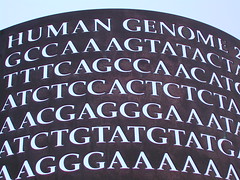May 6th, 2010 by PhilBaumannRN in Better Health Network, Health Policy, Opinion, Research
No Comments »


As the costs of sequencing our DNA shrink and the roles of digital media in our lives expand, we will need to understand who (or what) controls the ownership, access and use of our genomic information.
From state regulation to Google to Facebook, who controls the acquisition, transmission and replication of our genomic information and material will become an important battle in the 21st century. Read more »
*This blog post was originally published at Phil Baumann*
April 25th, 2010 by Debra Gordon in Better Health Network, Medblogger Shout Outs, Opinion, True Stories
1 Comment »

 So you’re probably wondering what I’m doing blogging about social networking when this is a blog about health and medicine and medical writing. Well, just consider:
So you’re probably wondering what I’m doing blogging about social networking when this is a blog about health and medicine and medical writing. Well, just consider:
- Thousands of tweets are sent every hour about health/medical issues. Want a cool way to follow them? Check out Health Tweeder.
- Thousands of health care professionals, medical organizations and healthcare facilities have Facebook pages.
And I’m sure that’s only the beginning. Those, together with Linked In, are the only social networking sites I currently use so that’s all you get for now. Read more »
*This blog post was originally published at A Medical Writer's Musings on Medicine, Health Care, and the Writing Life*
April 6th, 2010 by Berci in Better Health Network, News, Research
No Comments »

This is the era of evidence-based social media as more and more papers focusing on medicine and social media are coming out. An interesting paper was published a few days ago in the American Journal of Infection Control. Scanfeld et al. tried to reveal the rate of misunderstanding or misuse of antibiotics in Twitter messages in their study: Dissemination of health information through social networks: Twitter and antibiotics.
BACKGROUND: This study reviewed Twitter status updates mentioning “antibiotic(s)” to determine overarching categories and explore evidence of misunderstanding or misuse of antibiotics.
METHODS: One thousand Twitter status updates mentioning antibiotic(s) were randomly selected for content analysis and categorization. To explore cases of potential misunderstanding or misuse, these status updates were mined for co-occurrence of the following terms: “cold + antibiotic(s),” “extra + antibiotic(s),” “flu + antibiotic(s),” “leftover + antibiotic(s),” and “share + antibiotic(s)” and reviewed to confirm evidence of misuse or misunderstanding.
RESULTS: Of the 1000 status updates, 971 were categorized into 11 groups. Cases of misunderstanding or abuse were identified for the following combinations: “flu + antibiotic(s)” (n = 345), “cold + antibiotic(s)” (n = 302), “leftover + antibiotic(s)” (n = 23), “share + antibiotic(s)” (n = 10), and “extra + antibiotic(s)” (n = 7).
CONCLUSION: Social media sites offer means of health information sharing. Further study is warranted to explore how such networks may provide a venue to identify misuse or misunderstanding of antibiotics, promote positive behavior change, disseminate valid information, and explore how such tools can be used to gather real-time health data. 




*This blog post was originally published at ScienceRoll*
March 17th, 2010 by Bryan Vartabedian, M.D. in Better Health Network, Opinion
1 Comment »

The time is approaching when businesses will want to capture the eyes and minds of physicians in the social world. Throwaways and mailouts will give way to more current channels of communication. Friends in the health
industry ask how they should connect with physicians using social media channels.
The rules really aren’t much different but here are a couple of things the consultants will never tell you:
I’m not on Sermo. While Sermo and Ozmosis may seem like obvious targets, physician specific verticals are tricky. The road to the successful physician network is littered with the skeletons of startups who went broke trying to capture our eyeballs. While its hard to ignore Forrester’s bullish analysis of services like Sermo, I don’t
expect the enthusiasm to be sustained. Look to the next iteration of IMedExchange to possibly be a game changer
in this area. Until then, the connectors who are going to get you where you want to go aren’t necessarily hangin’
with other doctors. They’re found in the wild. Read more »
*This blog post was originally published at 33 Charts*
March 16th, 2010 by DrWes in Better Health Network, Health Tips
No Comments »

With the explosion of social media, I am amazed at how many cardiologists I encounter who know little to nothing about blogs, Twitter, Facebook, Google Buzz and the like. “I’m too busy.” “Who has time for that stuff?” “I wouldn’t have time for anything else.” “How can I possibly keep up?”
And yet today, as more and more patients reach out to the web to find medical information or, more importantly, their doctor, physician specialists of all types should probably be asking, “Can I afford to not be connected with social media in one way or another?”
Google yourself. Read more »
*This blog post was originally published at Dr. Wes*


















